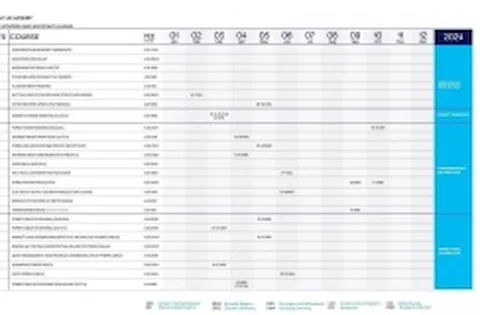HVDC Submarine Power Cable training course
This five day training course focuses on HVDC submarine power transmission. Participants will obtain a holistic view and sound understanding of the various issues and topics that make HVDC submarine cables unique.
The development of HVDC transmission systems has become increasingly important in recent years, as these systems can transmit large amounts of power over long distances with minor losses. Underground power cables are one of the technologies used in more and more applications. An obvious use of HVDC cables is for submarine applications. Submarine cables are used to connect offshore installations, such as production platforms in the oil & gas sector or substation platforms in the offshore wind sector, to the mainland grids.
Although the cables account for just a small percentage of the total investment in the required equipment, failure would result in high costs relating to lost production and repair. Given the potential costs, investors want to mitigate risks. Despite the existence of various standards, guidelines and recommendations, there is no overall quality standard for the cabling process from start to finish. The design, manufacturing, testing and commissioning of a submarine cable thus need to be carefully implemented, including quality assurance and quality control in each phase.
This five day course will address and highlight the entire HVDC submarine cable life cycle, providing participants with a holistic view and sound understanding of HVDC submarine power cables and their accessories. It will also include an overview of the risks during the various phases of an HVDC project.
Subjects:
- Introduction
- HVDC system technology
- Cable system design parameters
- Cable design parameters
- Cable materials & accessories
- Cable joints and terminations
- Health, safety and environment
- Marine survey
- Cable routing
- Cable installation on land and subsea
- Cable ageing and cable failures
- Quality assurance and quality control, inspections and testing
- Testing, maintenance and failure investigation
- Asset management of HVDC submarine power cables during the operation phase
Your benefits
■ An understanding of the parameters which differentiate submarine cables from land underground cables
■ An understanding of the reasons for and benefits of using HVDC submarine power cables
■ An understanding of the most important parameters during the design and commissioning of HVDC submarine cables
■ Knowledge of the methods to mitigate the possibility of failures
■ Insight into how to develop your set of requirements, methods and techniques.
Target Audience:
Engineers and other staff from companies with an interest in improving the quality of HVDC submarine cables, including: cable manufacturers, cable installers, offshore energy project developers, TSOs and DSOs, energy utilities, energy project investors, insurance companies, investors, etc.
A Bachelor of Engineering degree is recommended.
DNV offers a range of courses in the field of power cables:
- Ageing, quality assurance, testing, diagnostics and failures of power cables
- Asset management, maintenance and remaining life of power cables
- HVDC power cables
- Submarine power cables
For those interested in HVDC in general (not only cable related), please note that we also offer a three day modular HVDC VSC Technologies providing knowledge and understanding of HVDC technology.
This course is only available upon request as in-company training (content, location and duration can be adapted to your specific wishes). Please contact us for more information.


